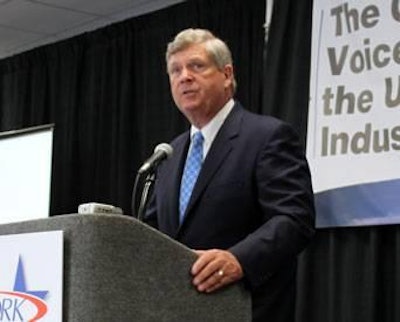
U.S. Secretary of Agriculture Tom Vilsack announced the launch of a U.S. Department of Agriculture program to assist the pork industry battle the porcine epidemic diarrhea (PED) virus outbreak. Speaking at a luncheon at the World Pork Expo June 5 in Des Moines, Iowa, he outlined the USDA's response to the PED virus epidemic.
"Today, we are beginning effort to partner to better monitor, trace and control the PEDv outbreak," said Vilsack. "A federal order is being issued that will require producers to notify the USDA, their veterinarian or the state veterinarian of any outbreak. We need to better monitor, control and trace the path of the virus."
Watch a video of Vilsack's presentation to learn more about the federal order: www.WATTAgNnet.com/168575.html
That order includes a significant financial commitment from the USDA. Vilsack said US$23 million would be available immediately and a US$40 million allocation will be included in the 2015 budget. The money will go into multiple channels, including financial support for producers impacted by the virus.
Vilsack explained that initially there will be US$4 million for additional research for vaccine development, several million to state agriculture departments to pay for control efforts and US$11 million for a cost-sharing program to help impacted producers pay for additional biosecurity.
"We recognize that it is important to create better understanding of viruses, how they came into this country and how to eradicate them," said Vilsack. He said a quick and effective response to the PED virus is important to U.S. agricultural policy, today and in the future.
"We live in a global economy," said Vilsack. "There are many positives of that for agriculture, which includes record trade levels for American agriculture. To continue that, we have to be ready for risks from global trade — things coming into our country that can cause problems."
He cited the PED virus as an example of that risk. "A year ago, there were 100 producers impacted. Now there are 4,700 operations with an increase of 100 to 150 outbreaks [per] week. This is an expanding issue; we need to deal with it, and deal with it aggressively," said Vilsack.
Speaking before both trade and consumer press, Vilsack emphasized that the PED virus is an animal health issue, not a food safety or public health issue. "Nevertheless, we take PEDv very seriously. Producers cannot afford to lose millions of pigs. We've had record exports in pork and will break that record this year. It's critically important for us to find ways to deal with these viruses to protect the industry."
When asked if the industry's and government's response to the PED virus thus far could be seen as a failure, Vilsack answered no but admitted it is a challenge. "We have been working with the industry collaboratively, and I think we are taking the right steps now. It was important to identify the resources needed to combat this and have a better understanding of the virus' pathway before we formed a plan. This is the type of challenge we are going to be confronting in a global economy."
Vilsack said the program is being implemented immediately, but it will take about four weeks to get fully in place. When asked about overcoming reluctance of producers to submit to reporting, he countered that reporting is in the industry's and individual producer's best interest. He pointed out that money will be available to producers to help cover the costs of increased biosecurity and containment of the virus.
"We have tried to find [the] right balance," said Vilsack. "There are no quarantine requirements or transportation restrictions in this program. If the producer complies, he will get financing to help with implementation."

















